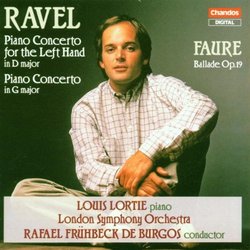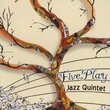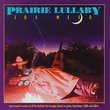| All Artists: Gabriel Faure, Maurice Ravel, Rafael Frühbeck de Burgos, London Symphony Orchestra, Louis Lortie Title: Ravel: Piano Concerto for the Left Hand in D major, Piano Concerto in G major; Faure: Ballade, Op. 19 Members Wishing: 0 Total Copies: 0 Label: Chandos Original Release Date: 1/1/2000 Re-Release Date: 10/28/1992 Genre: Classical Styles: Chamber Music, Forms & Genres, Ballads, Concertos, Historical Periods, Classical (c.1770-1830), Instruments, Keyboard Number of Discs: 1 SwapaCD Credits: 1 UPC: 095115877326 |
Search - Gabriel Faure, Maurice Ravel, Rafael Frühbeck de Burgos :: Ravel: Piano Concerto for the Left Hand in D major, Piano Concerto in G major; Faure: Ballade, Op. 19
 | Gabriel Faure, Maurice Ravel, Rafael Frühbeck de Burgos Ravel: Piano Concerto for the Left Hand in D major, Piano Concerto in G major; Faure: Ballade, Op. 19 Genre: Classical
Ravel's Concerto for the Left Hand is one of the most brilliant and important of 20th-century concertos for any instrument. Composed for Paul Wittgenstein, a pianist who lost his right arm during World War I, there is n... more » |
Larger Image |
CD DetailsSynopsis
Amazon.com Ravel's Concerto for the Left Hand is one of the most brilliant and important of 20th-century concertos for any instrument. Composed for Paul Wittgenstein, a pianist who lost his right arm during World War I, there is no way by simply listening that you would ever know its secret. Both of Ravel's concertos were heavily influenced by jazz--possibly also by his acquaintance with Gershwin--and successful performances must combine his customary precision with a certain ability to "swing" the tunes. Louis Lortie certainly knows how to project the music to fine effect, and these bold versions, full of character, certainly rank with the best. A very fine disc. --David Hurwitz Similar CDs
|
CD ReviewsFantastic and Fun E. Bishop | Northampton, MA USA | 05/03/2001 (5 out of 5 stars) "I saw this pianist perform the Piano Concerto in G major at Tanglewood last summer, having never heard the piece before. I enjoyed the performance so much, I had to get the disc. It is now one of my favorites! Getting the Piano Concerto for the Left Hand along with it was a great bonus, too. Highly recommended!" (+) Too Gorgeously Refined for Its Own Good C. Pontus T. | SE/Asia | 09/21/2008 (4 out of 5 stars) "Moving on from the sleepy Thibaudet/Dutoit (Jean-Yves Thibaudet - Ravel: Piano Concertos, etc.) and 'boxy' Collard/Maazel (Ravel: Piano Concertos; Pavane pour une infante défunte; Jeux d'eau; La valse), we are now approaching some really great stuff. Played by a master, these masterful twin Concertos just knock out just about all others. The more conventional G major Concerto is often held as the masterpiece. It's happened before and decisively so this time: against 'conventional' wisdom, I deem the D major superior. Why is that? Listen to Lortie! It's actually quite hard to figure out he's only using his left hand. This is where the unique mastery of Ravel's genius reveals itself. Several good composers (e.g. Hindemith, Schmidt, Bortkiewicz, Britten) and a few great (Prokofiev, Korngold, Strauss) attempted to compose left-hand concertos--most of which were commissioned by Paul Wittgenstein (who lost his right hand in WWI). However, none of them came even close to Ravel's.
Lortie's D major is one of the greats--about at the same level as Zimerman's and Gavrilov's. Whereas both the latter are more brilliantly exciting, Lortie is the most refined. He receives great support from the LSO under Frubeck de Burgos and, as always, a lovely recorded sound from the Chandos engineers--perfectly natural and atmospheric, still uncovering details normally obscured; though, somewhat yielding in brilliance to DG's demonstration sound for Zimerman. Also the Faure Ballade is done in the most exquisite manner--I truly doubt its smooth roulades could possibly be played with a more gorgeous tone, all in perfect balance with the orchestra and the sound reproduction. Then there's only the G major left. Let me try to spell out my beef: Again, Lortie and de Burgos are utterly refined--too much refined, so that things become somewhat static and lose momentum. The most telling example is the second movement--with that angelic melody that just makes one cry--which is every much so gorgeous, but sort of only that. This melody shouldn't only make you cry but also fill you with the instinctively primal desire to leave earth and follow the angel to wherever he or she belongs. What do I mean? Just hold your horses for Argerich, and above all that Zimerman guy. No surprise that Lortie also gave us the reference digital set of Ravel's piano works--dessert island stuff without a doubt. Thus, I really hate holding back the fifth star (leaving only the small plus in brackets)--but to be fair, and to give the rating some kind of meaning, I have to as there is guy out there called Krystian Zimerman..." |

 Track Listings (5) - Disc #1
Track Listings (5) - Disc #1

